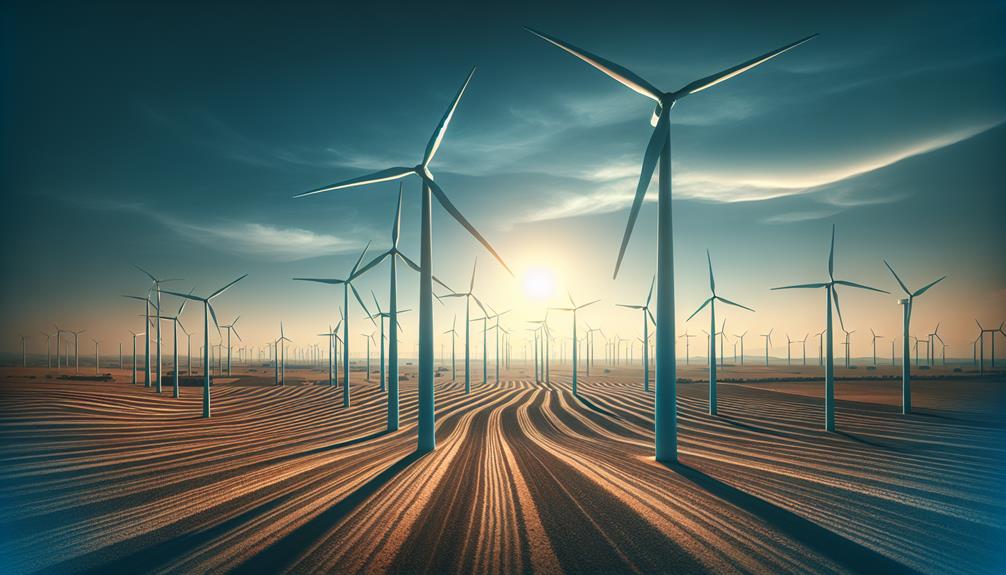What Is The Definition Of Green Energy
Imagine you're standing on a pristine beach, the ocean waves crashing against the shore in a harmonious rhythm. As you look out, you notice a majestic wind turbine gracefully spinning in the distance, harnessing the power of the wind to generate electricity. This scene represents the essence of green energy – the utilization of renewable resources to produce clean and sustainable power.
What Is The Definition Of Green Energy
But what exactly does green energy entail? How is it different from conventional sources of energy? In this discussion, we will explore the definition of green energy, its various sources, the advantages it offers, the challenges it faces, and its promising future.
What Is The Definition Of Green Energy
So, let's embark on this journey to understand the true meaning and potential of green energy.
What Is The Definition Of Green Energy
Key Takeaways
What Is The Definition Of Green Energy
- Green energy refers to renewable sources of energy that are environmentally friendly and have minimal or no negative impact on the environment.
- Transitioning to green energy has economic benefits and positive environmental impact.
- Job creation is one of the key economic benefits of green energy.
- Green energy sources significantly reduce air and water pollution.
Importance of Green Energy
What Is The Definition Of Green Energy
The importance of green energy can't be understated in our efforts to combat climate change and create a sustainable future. Green energy refers to renewable sources of energy that are environmentally friendly and have minimal or no negative impact on the environment.
What Is The Definition Of Green Energy
Transitioning to green energy has a multitude of economic benefits and positive environmental impact.
What Is The Definition Of Green Energy
One of the key economic benefits of green energy is job creation. The renewable energy sector has the potential to generate millions of new jobs globally. By investing in green energy technologies and infrastructure, countries can create a thriving green economy that supports local communities and stimulates economic growth.
In addition to economic benefits, green energy also has a significant positive environmental impact. Traditional energy sources such as fossil fuels contribute to air and water pollution, as well as greenhouse gas emissions. By utilizing green energy sources like solar, wind, and hydroelectric power, we can significantly reduce these harmful effects. Green energy is clean, sustainable, and helps to mitigate the adverse impacts of climate change.
Transitioning to green energy isn't only essential for our environment, but it also presents a unique opportunity to shape a more sustainable and prosperous future. By embracing green energy, we can create a world that's cleaner, healthier, and more sustainable for current and future generations.
Sources of Green Energy
To explore the various sources of green energy, we can now focus on the different renewable energy options available. These renewable alternatives provide sustainable power while reducing our dependence on fossil fuels.
Here are three sub-lists that highlight some of the most common sources of green energy:
- Solar Energy:
- Photovoltaic (PV) panels convert sunlight into electricity.
- Solar thermal systems use the sun's heat to generate power or heat water.
- Concentrated solar power (CSP) uses mirrors to reflect and concentrate sunlight onto a receiver, producing steam that drives a turbine.
- Wind Energy:
- Wind turbines harness the power of wind to generate electricity.
- Onshore wind farms are located on land, while offshore wind farms are situated in bodies of water.
- Wind power is a reliable and abundant source of clean energy.
- Hydropower:
- Hydroelectric plants generate electricity by harnessing the energy of flowing or falling water.
- Run-of-river systems divert a portion of the river's flow through turbines.
- Reservoir-based systems store water in dams, releasing it to generate power as needed.
These renewable sources offer sustainable power options that contribute to a greener and more environmentally friendly future. By investing in these alternatives, we can reduce carbon emissions and work towards a cleaner energy landscape.
Advantages of Green Energy
One major advantage of green energy is its significant contribution to reducing carbon emissions. By harnessing renewable resources such as sunlight, wind, and water, green energy sources produce electricity without the emissions of greenhouse gases that contribute to climate change. This contributes to environmental sustainability, as it helps to mitigate the harmful effects of fossil fuel-based energy production.
In addition to its environmental benefits, green energy also offers economic advantages. The growth of the green energy sector has created new job opportunities and stimulated economic growth in many regions. According to a study by the International Renewable Energy Agency (IRENA), the renewable energy sector employed over 11 million people worldwide in 2018. This demonstrates the potential for job creation and economic development in the transition to green energy.
To further illustrate the economic benefits of green energy, consider the following table:
| Economic Benefits of Green Energy |
|---|
| 1. Job creation |
| 2. Increased investment |
| 3. Energy cost savings |
Investing in green energy projects not only creates jobs but also attracts investment. Governments and businesses are increasingly recognizing the potential for economic growth in the renewable energy sector and are directing resources towards it. Moreover, the use of green energy can lead to cost savings for consumers and businesses, as renewable energy sources become more affordable and efficient.
Challenges in Adopting Green Energy
As the world continues to explore the advantages of green energy, it's important to address the challenges that arise in adopting these sustainable practices. While the transition to green energy is crucial for mitigating climate change and reducing dependence on fossil fuels, several obstacles must be overcome.
Here are some of the challenges faced in adopting green energy:
- Government policies: The lack of consistent and supportive government policies can hinder the widespread adoption of green energy. Incentives, subsidies, and regulations play a crucial role in encouraging investment and innovation in renewable technology. Clear and long-term policies are needed to provide certainty and attract investment in the green energy sector.
- High costs: The initial investment required for renewable technology can be a significant barrier. While the costs of wind and solar power have decreased over the years, they still remain higher than traditional fossil fuel sources. However, it's important to note that the long-term benefits, such as reduced carbon emissions and lower operating costs, make green energy a more sustainable choice in the long run.
- Infrastructure limitations: The development of green energy infrastructure, such as wind farms and solar panel installations, requires land, resources, and transmission lines. These infrastructure requirements can pose challenges, especially in densely populated areas where land availability is limited. Additionally, the integration of intermittent renewable energy sources into the existing power grid can present technical challenges that need to be addressed.
Overcoming these challenges requires concerted efforts from governments, businesses, and individuals. By implementing supportive policies, investing in research and development, and collaborating to build the necessary infrastructure, the adoption of green energy can be accelerated, leading to a more sustainable future.
Future of Green Energy
The future of green energy holds immense potential for transforming our energy systems and reducing our carbon footprint. Advancements in technology will play a vital role in shaping this future. With ongoing research and development, we can expect to see significant improvements in renewable energy sources such as solar, wind, and hydroelectric power. These advancements will lead to increased efficiency, lower costs, and wider adoption of green energy technologies.
The role of government is crucial in driving the transition towards a greener energy future. Governments can implement policies and regulations that support the development and deployment of renewable energy. This includes providing incentives for clean energy investments, setting renewable energy targets, and promoting research and development in the sector. By actively supporting the growth of green energy, governments can create a favorable environment for innovation and investment.
In addition to government support, technological advancements are also driving the future of green energy. Breakthroughs in energy storage, for example, are addressing the intermittent nature of renewable energy sources, making them more reliable and accessible. Improved grid integration and smart energy management systems are also enabling the efficient use of green energy.
As we move forward, it's essential to continue investing in research and development to further advance green energy technologies. By doing so, we can accelerate the transition towards a more sustainable energy system and reduce our reliance on fossil fuels. The future of green energy is within our grasp, and with the right policies and technological advancements, we can create a cleaner and more sustainable future for generations to come.
Conclusion
Congratulations! You've just uncovered the magic of green energy, a powerful force that holds the key to a sustainable future. By harnessing renewable sources like sun, wind, and water, we can unleash a tidal wave of benefits – cleaner air, lower carbon emissions, and energy independence.
However, the journey towards a greener world won't be a walk in the park. We must overcome the challenges and embrace this promising future.
So let's join hands and embark on this electrifying adventure together!

